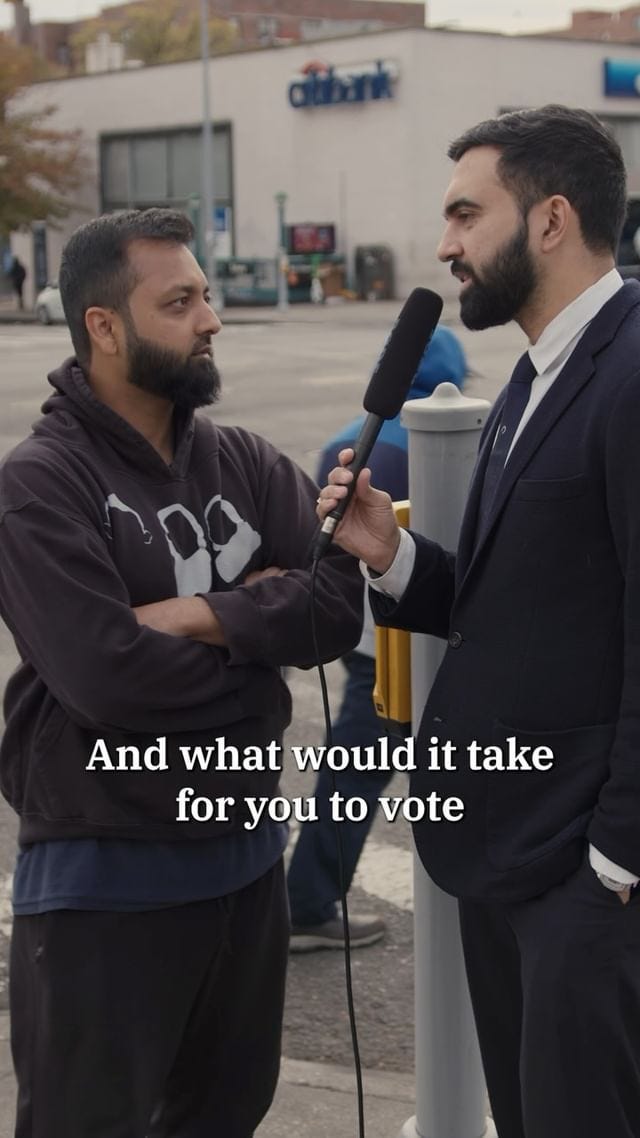The Library of Babel
On infinite libraries, totalitarian propaganda, and a new song cycle
I’m sitting in a grayish hotel room in downtown Durham, having just returned from coffee and breakfast at a joint across the street. Beyond the window: hazy skies, a tree line in muted autumnal colors, the tops of office buildings. A stillness that belies the unflagging chaos in the world.
Tonight, Caroline Shaw and I will give the fifth performance of ‘Hexagons,’ a jointly written song cycle-ish thing infused with a handful of theatrical gestures. The piece is a response to Jorge Luis Borges’ story “The Library of Babel,” in which the visionary Argentinian brings to life, in a mere seven pages, a fully-fleshed and fantastical world. Here is the universe as a library: within it are all possible books, organized in identical and infinitely repeating hexagonal galleries.
Each wall of each hexagon is furnished with five bookshelves; each bookshelf holds thirty-two books identical in format; each book contains four hundred ten pages; each page, forty lines; each line, approximately eighty black letters.
But for all of the library’s outward appearance of order, the books themselves conform to no system of organization: there is no card catalog, no alphabetization, no codex. Beyond this, many volumes contain nothing but random letters.
One book, which my father once saw in a hexagon in circuit 15-94, consisted of the letters M C V perversely repeated from the first line to the last. Another (much consulted in this zone) is a mere labyrinth of letters whose penultimate page contains the phrase O Time thy pyramids. This much is known: For every rational line or forthright statement there are leagues of senseless cacophony, verbal nonsense, and incoherency.
For years, Caroline and I were independently fascinated by the story before the opportunity to collaborate on this work arose. In fact, we’d each considered writing an opera using Borges’ tale as source material. Of course, it’s impossible to read the story in the 21st century without seeing the library as a metaphor for the internet age. But I don’t think either of us could have anticipated the extent to which Borges’ animating premise would resonate with our increasingly vexed information landscape.
Borges was in many ways a science fiction writer, and he delighted in the invention of worlds that sit on the knife’s edge of paradise and hell. Certainly this is the case with “Babel,” where the seductive possibility of having access to everything is blunted not only by the overwhelm of unlimited information, but by the inability to find the thing for which one is searching.
Where in the past I’ve read the story in relation to the total cultural output of the world, and the deep sadness that comes from the knowledge that one can never read, hear, or see all of the books, songs, and dances one wishes to encounter, today I woke thinking of the story as a metaphor for social and political atomization. We are all trapped in our own hexagons, poring over the pages of its six-hundred-and-forty books in search of symbols that confirm our preexisting beliefs, lashing out at those who do not see what we see.
Indeed, the litany of recent election postmortems, though they diverge wildly in their conclusions, are connected by their attempts to sift through reams of data and trends en route to often reductive theses that tidily explain the outcome. What many of these accounts tend to miss—particularly those that blame one demographic group or another—is how little shared reality exists in our deeply fractured and fragmented media landscape. (To be sure, some of the more convincing explanations see that very landscape, itself, as a prime culprit.)
In this sense, perhaps Babel is a metaphor for what the exiled Russian journalist M. Gessen has described as the “cacophonous” approach to totalitarian propaganda, which is “overwhelming and inconsistent.” They continue:
It bombards you with mutually contradictory claims, which often come packaged in doublethink pairs. The Russian dissident singer-songwriter Alexander Galich sang about one such pair: “We stand for the cause of peace and we are preparing for war…” Far from promoting a single guiding ideology, this kind of propaganda robs you of your bearings. The regime gains a monopoly on reality, and can make any claim whatsoever. Hannah Arendt famously described the totalitarian ruler’s ascendance this way: “In an ever-changing, incomprehensible world the masses had reached the point where they would, at the same time, believe everything and nothing, think that everything was possible and that nothing was true… Mass propaganda discovered that its audience… did not particularly object to being deceived because it held every statement to be a lie anyhow.”
In Borges’ universe, librarians are driven to madness and suicide in their efforts to find order. In ours, the ascendant ruler has linked arms with craven tech billionaires who’ve rolled back moderation on their platforms with the express purpose of creating disorder, ushering in Arendt’s “incomprehensible world,” while leading the masses to believe “everything and nothing.”
My own belief is that most of the explanations for the outcome of the election hold some truth: inflation, global anti-incumbent sentiment, racism, misogyny, neoliberal/technocratic indifference to labor and the working class, mis- and disinformation, right-wing media, Biden’s decision not to step down sooner, Harris’ unremarkable policy proposals and lack of distancing from Biden’s complicity in the catastrophe in Gaza, her decision to cozy up to the Cheneys in an attempt to court some mythical constituency of nonexistent moderate Republicans, and so on and so forth.
And while I believe that liberals would do well to take more seriously left-wing economic critiques of the Democratic Party, and the notion that a politics rooted in fear and scapegoating succeeds most when people’s materials needs are not met, I am not so foolish as to believe that greater attention to these conditions alone could have swung the election. Indeed, the song I will keep singing until my throat is flayed is the one that insists that people are not monoliths, and that punching down on any one constituency—rather than punching up at the billionaires who preserve their stranglehold on power and capital through our division—is counterproductive.
But maintaining grace in this moment is difficult, and perhaps all the more so if you find yourself a target of the incoming administration. It’s hard to witness the vile attacks on the trans community, on women, on immigrants, on communities of color, and not be duped into the belief that everyone who cast a vote for Trump did so out of a penchant for cruelty. And yet, this simply is not the case.
It’s wild, but claiming that the electorate is heterodox is controversial in some circles! Meanwhile, there is a related discourse rocketing around the internet having to do with “calls for unity” and “coexistence.” From the vantage of my limited hexagon, a lot of it plays out in bad faith, with liberal critics making a caricature of left-wing pleas for class solidarity. I am not suggesting that anyone needs to be friends with those who would deny them their humanity or right to exist. Nor do I think it’s reasonable to blithely pursue “unity” with those who actively seek a turn toward right-wing authoritarianism.
Indeed, extending curiosity toward the ideological or cultural other is not the same as inviting him into your home. Humility in the face of a vast and varied electorate is not the same as sticking one’s head in the sand when it comes to the naked embrace of hatred and bigotry on display in the MAGA movement. But as I wrote a few weeks ago, achieving a world with universal health care, affordable housing, and living wages, requires a politics of solidarity. It requires a full embrace of the belief that my freedom is inextricably linked to yours. And yes, this is easier said than done.
Writing this in North Carolina, I cannot help but think of the Reverend William Barber II, who preached for three decades in Goldsboro, and is hailed by many as the closest thing we have today to a reincarnation of Dr. Martin Luther King, Jr. For my money, he may be the best contemporary exemplar of a politics of intersectionality, arguing in a recent interview with NPR that
there are five interlocking moral issues - systemic racism, systemic poverty, ecological devastation, denial of health care, the war economy and the false moral narrative of religious nationalism - and to be true to my calling, I have to be concerned about all of them.
Rather than flog my dead steed, I encourage you to listen to the interview in its entirety, and, while you’re at it, check out the 2022 Poor People’s Campaign report, which gives the lie to overly rosy claims about the health of the economy. Needless to say, basic material well-being is not optional. Neither is our spiritual health, which derives in no small part from the vibrancy of our physical communities. While our digital lives may entrap us in virtual hexagons, we are, unlike Borges’ librarians, able to step outside and touch grass, to greet our neighbor, to marvel with her at the same ancient oak tree in an open field. Or, hey, why not head into town and listen to some music?




On the art side of things, my friend Steve Peck wrote a terrifying little novella called "A Short Stay in Hell" that's an extended riff on the Library of Babel. You can read it in an afternoon, but it's not a book one easily forgets.
I always saw the story as commentary on totalitarianism: the exacting pursuit of conformity and (visible) ORDER with absolutely no concern for SENSE or functionality. As for the election....who the hell knows? We have a painfully uneducated populace- especially when it comes to critical thinking skills, civics, "citizenship", and government (a majority of the population reads at or below 6th grade level to boot). We live in a country where "racism" was absolutely integral to taking over the land and building a powerful and wealthy nation (it would have been far less likely had we considered Indigenous peoples, Blacks and Asians as equally human and deserving of rights). Something like 60% of the country is ONLY served by "news" outlets that are propaganda outlets for the Right and the other 40% gets news filtered through the right-to-neoliberal ideology of the business and money classes (this being what is referred to as "left" or "liberal" media). We have a more "churchy" population than Europe which teaches people unquestioning obedience to a leader. And then you have all the various voter-suppression techniques from gerrymandering to mass incarceration and learned apathy. I saw absolutely ALL of these at work during this election.